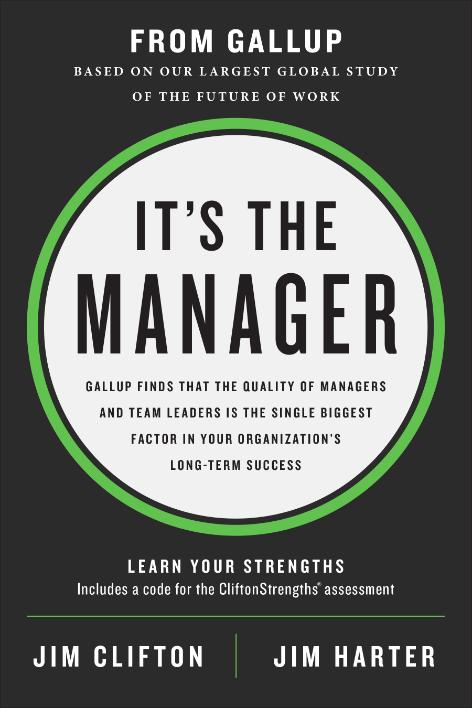Story Highlights
- Ineffective communication leaves room for rumors to increase uncertainty
- Leaders can stop misinformation from damaging engagement and culture
- Communication should be transparent, realistic and relationship-building
What?! Really? Where did you hear that?
Rumors can be a common source of news in the workplace -- especially right now as COVID-19 disrupts people's jobs and the economy everywhere.
As many have been sent home to work remotely (or some sent home to not work at all), the daily news reinforces that employees have newfound concerns about their day-to-day work and job security.
Teams may not be working in the same office together, but in most cases, they are still just as connected digitally -- some even more connected than before -- allowing rumors to fly further and faster than ever.
People don't want to wait to know what's happening. And here is the hitch:
A mere 13% of employees strongly agree the leadership of their organization communicates effectively with the rest of the organization.
The remaining 87% leaves a lot of room for misinformation to spread.
A mere 13% of employees strongly agree the leadership of their organization communicates effectively with the rest of the organization.
Just as we're seeing how simple talk of fake news (aka misinformation) in the media can divide and damage a country's morale and culture, misinformation inside the office can damage a company's morale and culture, too.
Rumors can get started about almost anything, and they can cause a lot of insecurity for employees. But leaders can anticipate many of them by considering obvious scenarios that will raise questions.
Here are unknowns that are likely fueling the rumor mills right now:
- What do the ongoing changes in the business landscape mean for our company's bottom line?
- Now that we're all working from home, will our office ever reopen?
- Will layoffs happen without notice?
- What will happen to benefits and bonuses?
- We went digital pretty much overnight -- will my role even be needed anymore?
The best way for leaders to address these concerns is by eliminating the need for an underground rumor network from the start.
Gallup's book It's the Manager sums it up like this:
"All organizations have problems they need to resolve. Whether people work through friction to fix problems or point fingers depends a lot on what they think of their leadership."
Instead of letting a rumor network take root, leaders can create a culture of trust through consistency in their own communication network and practices.
Here are three ways leaders can do this right now:
1. Add rumor busting to your meeting agendas -- despite issues that might arise.
Leaders and managers who invite open dialogue can foster a sense of "we're all in this together" and avoid creating a culture where no one speaks up (and they instead head straight to the gossip train).
As a leader, this gives you a chance to know what's on people's minds and make sure they know what you think from the start.
Invite questions to learn about people's concerns. If you aren't hearing much, don't kick the can down the road. Instead, communicate about the concerns you anticipate they may have -- things like:
- What you see coming based on known or predicted revenue shifts in the company.
- How leadership teams are enacting cost controls as a result.
- When tough decisions will need to be made about jobs, if that is even a concern, and when and what that could look like. Be sure to be caring and honest about what is known (and what cannot be known) and be clear that you will keep people in the loop.
- If bonuses, or other benefits or perks that will affect your employees' wellbeing, will be impacted, let them know what you know now.
It can be hard to address failures, controversies and awkward gossip that may come up in these questions. And especially now, given the tough topics that surface in times of crisis, but by dealing with this situation and those concerns in a caring but direct manner, you can become trusted and more relatable as a leader.
Simply being open shows employees that they can come to you with gossip. That you are willing to deal with them openly. And that, even if you don't know the answer, or don't know the appropriate one, you can find out and report back to them.
In all cases, if employees can trust you with sensitive topics, the topics themselves can become less problematic and will be less prone to causing insecurity.
"All organizations have problems they need to resolve. Whether people work through friction to fix problems or point fingers depends a lot on what they think of their leadership."
The best leaders and managers build relationships that inspire confidence; they ask for and receive tough questions, and work through the difficult times side by side with team members.
2. Be wary of sharing "inspirational" messages that lack substance.
Because leaders care a great deal about inspiring their followers, there can sometimes be a temptation to steer clear of negative (or real) issues. But when the inspirational messages don't align with reality -- it's a big problem.
It's described like this in, It's the Manager:
"At first, most employees want to believe the inspiring messages. But their day-to-day experiences make them question leaders' authenticity.
They are asked to change their course to align with a new initiative, but don't know why.
They get their annual review and have no idea why they didn't get the bonus or promotion they expected. Some slacker who plays office politics got it instead.
A benefit just got cut. Their manager blames it on upper management.
What do employees think about their inspiring leader now?"
We can agree that inspiring messages have a purpose. But to truly influence, a leader's emphasis must be on communication that connects with the daily reality of their people.
Leaders need to be honest so that they build trust.
Being realistic in this way can help your teams know that you care and trust them too, as you do your best to lead them to the brightest future possible, despite inevitable challenges and change.
3. Empower your managers with the authority to crush rumors.
Leaders can build their own loyal network by empowering their management team with critical information early and often.
Managers are the conduit of information in your company and they're closest to the action every day. But fewer than four in 10 managers strongly agree with the statement, "I have the authority I need to do my job effectively."
Instead, if employees see that their managers are "in the know" and are empowered to make decisions, they will start to go to their manager for clarity rather than alerting their rumor network.
Even though some questions or concerns may catch a manager off guard, for the most part, your company's managers should be in the know from the start.
The best leaders and managers build relationships that inspire confidence; they ask for and receive tough questions, and work through the difficult times side by side with team members.
If managers know the "why" behind hiring decisions, promotions, how your company is managing new remote-work policies and associated benefits, approaching the economic uncertainty, and other leadership decisions, it leaves less room for employees to become disgruntled or to speculate.
And when they don't like a reason, they know they'll have opportunities to talk about it in an appropriate way with their trusted manager.
As a leader, make sure you take charge of communication.
Now is a time for leaders to make regular and proactive communication an integral part of their core purpose in leading their constituencies.
Take charge of transparent communication so that fake news, rumors and gossip don't undermine the work you are doing to drive the performance and engagement of your team.
Teams crave more communication than ever during periods of disruption. Digital tools or even something as old school as a telephone call provide just the right means to stay connected and to keep the conversations open when face-to-face contact is not possible.
This will help you to be among the 13% of leaders who communicate effectively with their teams, enabling you to stop misinformation before it becomes a drag on your culture. Though always important, the stakes of communicating effectively are higher now more than ever.
Learn more about leading through disruption:
- Explore Gallup's COVID-19 analytics, advice and webinars.
- Use Gallup's COVID-19 Leadership Audit to gauge the success of your approach.





